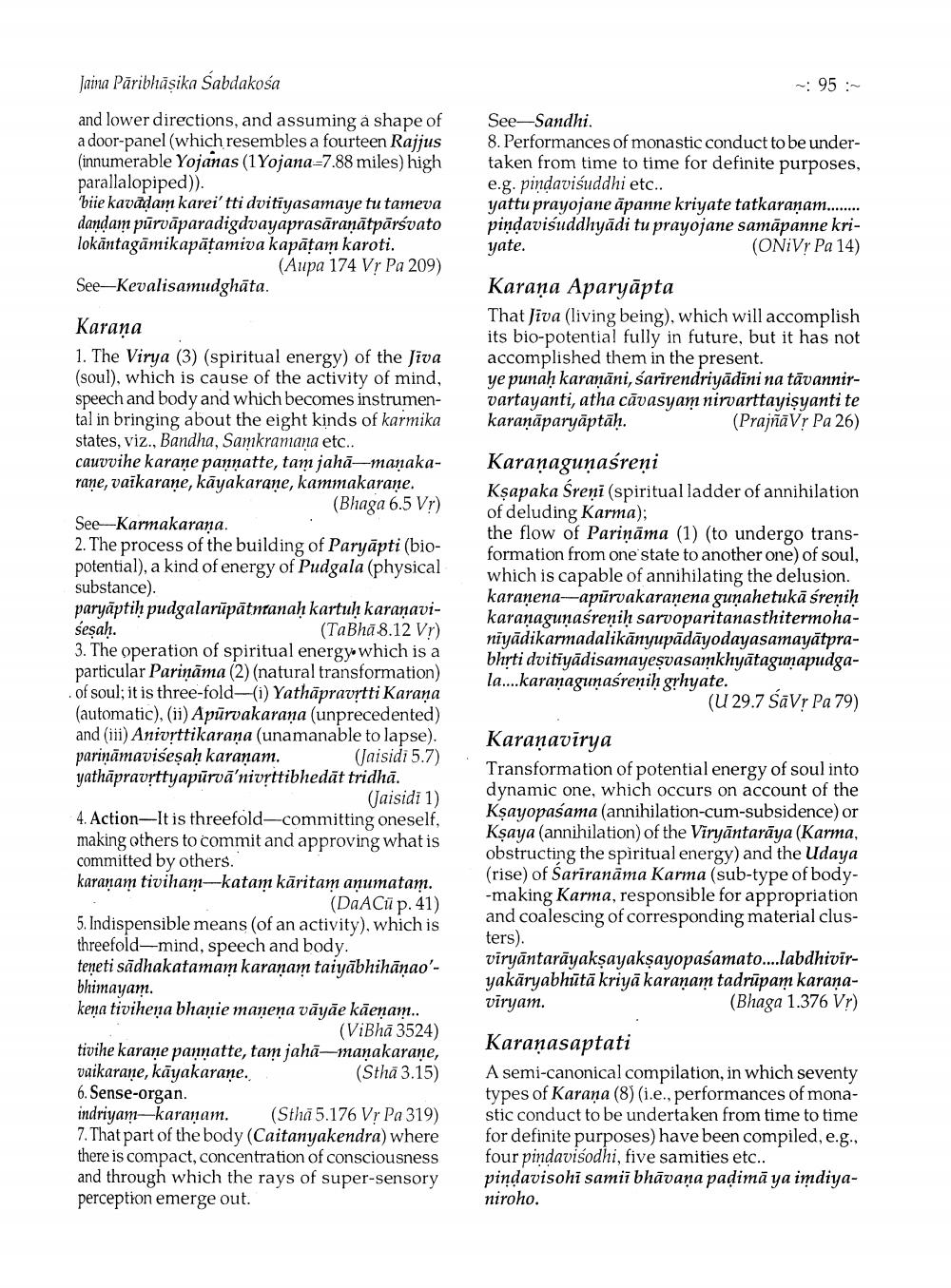________________
-:95:
Jaina Pāribhāsika Sabdakosa and lower directions, and assuming a shape of a door-panel (which resembles a fourteen Rajjus (innumerable Yojanas (1 Yojana=7.88 miles) high parallalopiped)). 'biie kavādam karei'tti dvitiyasamaye tu tameva dandam pūrvāparadigdvayaprasāranātpārsvato lokäntagāmikapātamiva kapātam karoti.
(Aupa 174 VPa 209) See-Kevalisamudghāta.
See-Sandhi. 8. Performances of monastic conduct to be undertaken from time to time for definite purposes, e.g. pindavisuddhi etc.. yattu prayojane äpanne kriyate tatkaranam........ pindavisuddhyādi tu prayojane samāpanne kriyate.
(ONiVr Pa 14)
Karaņa Aparyāpta That Jiva (living being), which will accomplish its bio-potential fully in future, but it has not accomplished them in the present. ye punaḥ karaṇāni, sarirendriyādini na tāvannirvartayanti, atha cāvasyam nirvarttayisyanti te karaṇāparyāptāḥ.
(PrajñāV Pa 26)
Karaņa 1. The Virya (3) (spiritual energy) of the Jiva (soul), which is cause of the activity of mind, speech and body and which becomes instrumental in bringing about the eight kinds of karmika states, viz., Bandha, Samkramana etc.. cauvvihe karane pannatte, tam jaha-manakarane, vaikarane, kāyakarane, kammakarane.
(Bhaga 6.5 Vr) See-Karmakarana. 2. The process of the building of Paryāpti (biopotential), a kind of energy of Pudgala (physical substance) paryāptih pudgalarūpātmanaḥ kartuḥ karanaviseṣaḥ.
(TaBhā:8.12 Vr) 3. The operation of spiritual energy which is a particular Pariņāma (2) (natural transformation) of soul; it is three-fold-(i) Yathāpravrtti Karana (automatic), (ii) Apūrvakarana (unprecedented) and (11) Anivșttikarana (unamanable to lapse). pariņāmavisesaḥ karanam. (Jaisidi 5.7) yathāpravrttyapūrvā'nivrttibhedät tridhā.
(Jaisidi 1) 4. Action-It is threefold-committing oneself, making others to commit and approving what is committed by others. karanam tiviham-katam kāritam anumatam.
(DaACü p. 41) 5. Indispensible means (of an activity), which is threefold-mind, speech and body. teneti sādhakatamam karanam taiyābhihānao'bhimayam. kena tivihena bhanie maneņa vāyāe kāenam..
(ViBhā 3524) tivihe karane pannatte, tam jaha-manakarane, vaikarane, kāyakaraṇe.
(Stha 3.15) 6. Sense-organ. indriyam-karaṇam. (Sthā5.176 Vr Pa 319) 7. That part of the body (Caitanyakendra) where there is compact, concentration of consciousness and through which the rays of super-sensory perception emerge out.
Karanaguņaśreni Kșapaka Sreņi (spiritual ladder of annihilation of deluding Karma); the flow of Pariņāma (1) (to undergo transformation from one state to another one) of soul, which is capable of annihilating the delusion. karanena-apūrvakaraṇena gunahetukā śrenih karanagunasrenih sarvoparitanasthitermohaniyādikarmadalikānyupādāyodayasamayātprabhrti dvitiyādisamayeşvasamkhyātagunapudgala....karanagunasrenih grhyate.
(U 29.7 ŚãV? Pa 79) Karaṇavīrya Transformation of potential energy of soul into dynamic one, which occurs on account of the Kşayopasama (annihilation-cum-subsidence) or Kşaya (annihilation) of the Viryāntarāya (Karma, obstructing the spiritual energy) and the Udaya (rise) of Sariranāma Karma (sub-type of body-making Karma, responsible for appropriation and coalescing of corresponding material clusters). viryāntarāyakşayakşayopaśamato....labdhiviryakāryabhūtā kriyā karaṇam tadrūpam karaņavīryam.
(Bhaga 1.376 Vr)
Karanasaptati A semi-canonical compilation, in which seventy types of Karana (8) (i.e., performances of monastic conduct to be undertaken from time to time for definite purposes) have been compiled, e.g., four pindavisodhi, five samities etc.. pindavisohi samii bhāvana padima ya imdiyaniroho.




